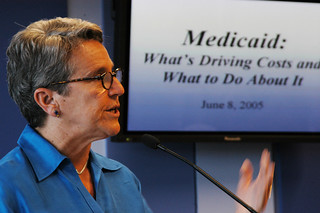It always frustrates me when politics and fear drive institutional decisions rather than making decisions based on facts. One of my biggest pet peeves in this area is the hype surrounding the flu vaccine. I was reminded of this today when I heard about the new study casting doubt on the effectiveness of the vaccine.
To be clear, I am not at all opposed to people choosing to get vaccinated, nor am I opposed to organizations providing incentives such as free access to the vaccine in hopes of helping more people to choose to get vaccinated. My problem comes when organizations mandate that people get vaccinated – which is becoming more and more popular in health care organizations regardless of whether any employee or class of employees has any significant likelihood of having any patient contact. I also have a problem with all the public disinformation campaigns where the flu vaccine is heavily pushed by giving the impression that they are more effective than they really are.
The study that I heard about today indicates that the flu vaccine is effective in just over half of those adults who receive it. This is fully 1/3 less effective than has previously been claimed.
Along with that I was disappointed with the way the story was presented by KSL. They talked about the study and how disappointing it was to have this finding coming at the beginning of the flu season. That is in line with their reports last week that the flu was reaching epidemic proportions already early in the flu season. That statement would not bother me except that it’s hard to call this the beginning of the flu season when they were reporting 5 months ago that flu season was right around the corner. That made me question how long flu season is. As is often the case – Wikipedia provided the answer:
In the United States, the flu season is considered October through May. It usually peaks in February.
In other words, this is halfway through the flu season and approaching the peak. I guess they could argue that we are at the beginning of the peak of flu season but that is misleading at best when they have been promoting the flu shot for 5 months already.
Secondly, since I was at Wikipedia I wanted to get some information about the effectiveness of the vaccine that was not tied to this shocking new study. What I found there was even more disappointing to me. All my life I have been taught that the flu vaccine was most important for the physically weaker members of society like elderly and young children. Imagine my surprise when Wikipedia informs me that:
The group most vulnerable to non-pandemic flu, the elderly, is also the least to benefit from the vaccine.
So now I can see that the vaccine is less effective than previously claimed and that those who have been most encouraged to receive it are least likely to benefit from it. In a final blow to the hype surrounding this vaccine I also learned that, although we are strongly encouraged to get vaccinated each year:
protection without revaccination persists for at least three years for children and young adults.
This leads to one of two conclusions. Either vaccination every year is excessive or else we are fighting a losing battle against a disease that mutates every year so that we must be perpetually subjected to a vaccine that is barely 50% effective.
I don’t know about other people but that tells me that mandating that people receive the vaccine is based on an agenda that goes well beyond the facts – and I hate the very idea of such fear mongering.









